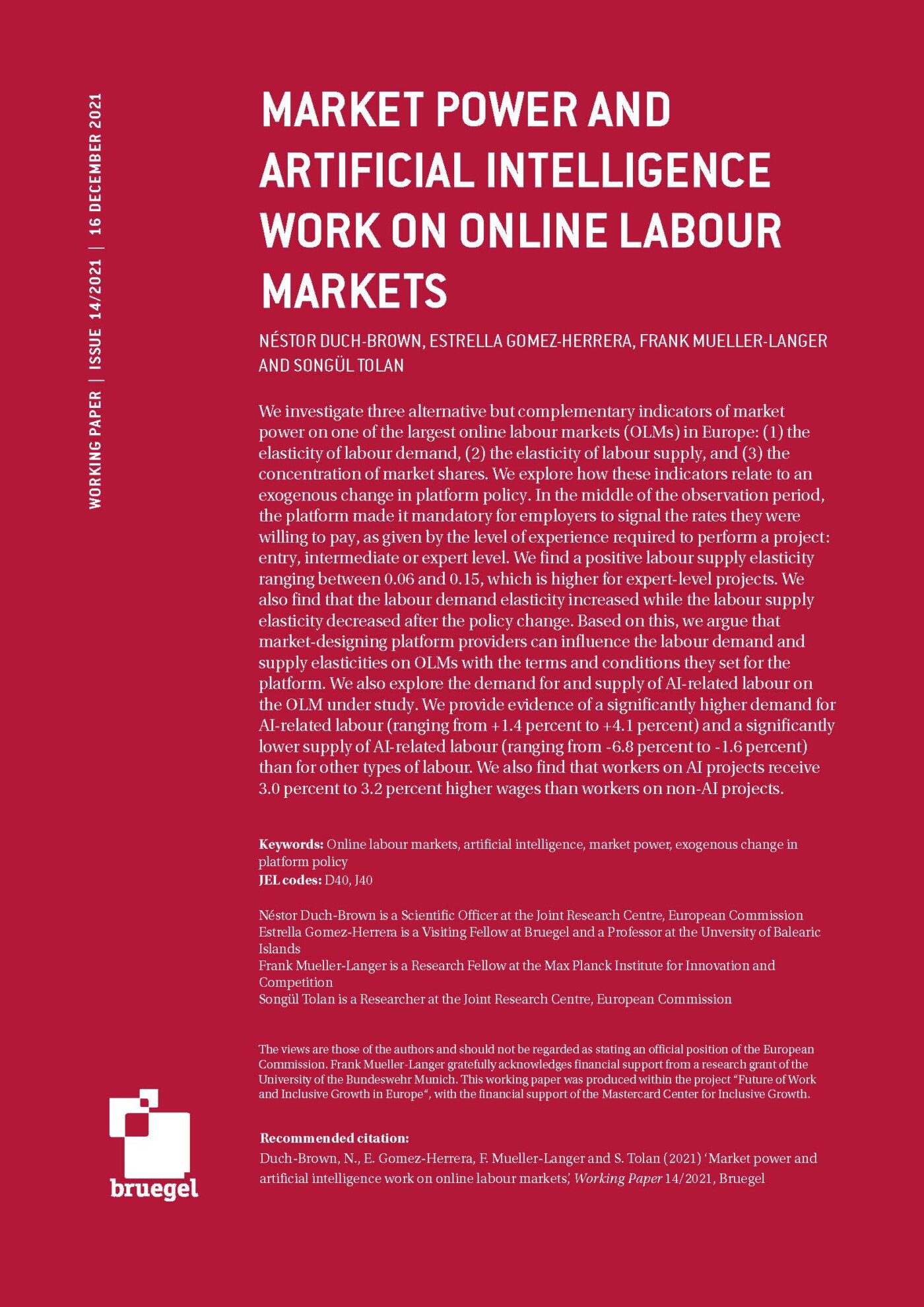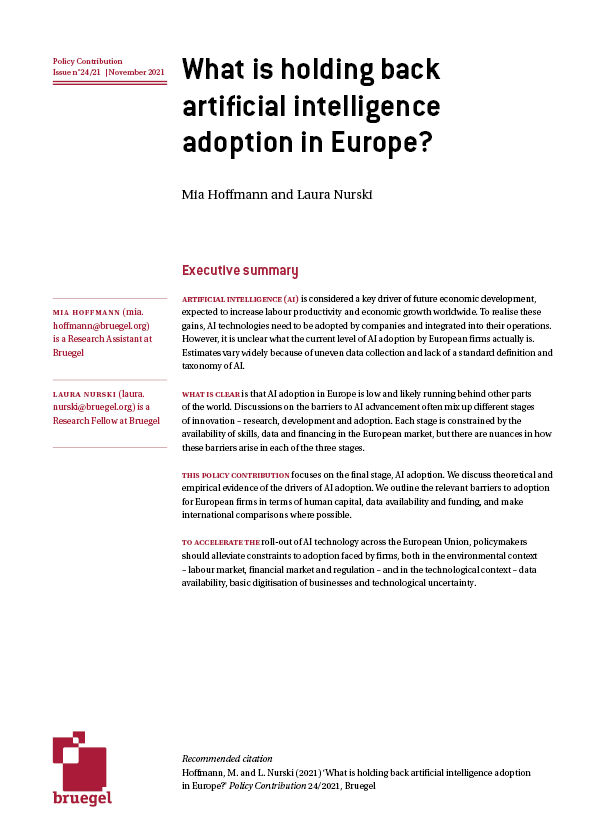Blog Post
Artificial intelligence’s great impact on low and middle-skilled jobs
Artificial intelligence and machine learning will significantly transform low-skilled jobs that have not yet been negatively affected by past technological change.
The academic literature suggests that, in the past decades, technological progress has led to job polarisation in European Union countries. While computer technologies and robots have replaced, to some extent, routine middle-skilled jobs such as machine operation, construction work or administrative work, they have also led to an increase in complementary, non-routine high-skilled jobs (eg managers, professionals) and in low-skilled jobs (eg agriculture, cleaning and personal care services). However, our new research suggests that the new technologies that have emerged since 2010 – artificial intelligence and machine learning – are set to change drastically the job landscape over the next few decades. These technologies are likely to have a deeper impact across a wider range of jobs and tasks, including possible destruction of low-skilled jobs.
(…) new technologies that have emerged since 2010 – artificial intelligence and machine learning – are set to change drastically the job landscape over the next few decades. These technologies are likely to have a deeper impact across a wider range of jobs and tasks, including possible destruction of low-skilled jobs.
Artificial intelligence (AI) systems are able to perform tasks that involve decision-making, therefore changing the impact of automation on the workforce. AI-powered technologies can now retrieve information, coordinate logistics, handle inventories, prepare taxes, provide financial services, translate complex documents, write business reports, prepare legal briefs and diagnose diseases. Moreover, they are set to become much better at these tasks in the next few years thanks to machine learning (ML): computers fed by big data can learn, practice skills and ultimately improve their own performances and perform their assigned tasks more efficiently.
Our new working paper evaluates the ‘probability of automation’ for different jobs, using data from 24 European countries. This probability is initially computed at the job task level and then aggregated at the occupational level (Table 1). Since each job consists of a variety of tasks, with different potential for automation, the probability of automation at the job level does not necessarily mean the destruction of jobs, but rather whether automation can significantly transform the nature of those jobs.
Table 1: European jobs with the highest and lowest probabilities of automation

Source: Brekelmans and Petropoulos (2020) based on Nedelkoska and Quintini (2018).
We use this measure of automation in an aggregate framework where jobs are grouped into three different categories of skill: low, middle and high-skilled jobs. Figure 1 shows the results.
Figure 1: Exposure to automation of different skill groups

Source: Brekelmans and Petropoulos (2020).
These results suggest that artificial intelligence and machine learning will have different impacts compared to computer and robotic technologies, which caused job polarisation (drop in routine middle-skilled jobs and increase in low-skilled jobs). In contrast, AI is highly likely to significantly alter not only middle-skilled jobs, but also low-skill employment. Moreover, while the high skilled are relatively less at risk from AI and ML-induced transformation, its impact is still non-negligible for these jobs.
The results also suggest a future transformation of work. In middle and low-skilled jobs, AI systems will complete the easily automated tasks while humans continue to perform those that cannot be automated. A high probability of automation may also be associated with the creation of new tasks and jobs though the productivity gains from adopting AI technologies, but these jobs and tasks will most likely be high-skilled.
The transformative nature of AI and ML requires proactive measures to re-design labour markets. Countries with high degrees of labour flexibility, high quality science education and less pervasive product market regulations tend to have higher skill-oriented job structures and are therefore less exposed to labour transformation due to automation.
The transformative nature of AI and ML requires proactive measures to re-design labour markets. The workforce needs to be prepared for the upcoming changes, while the efficiency gains from these technologies should be harnessed. Countries with high degrees of labour flexibility, high quality science education and less pervasive product market regulations tend to have higher skill-oriented job structures and are therefore less exposed to labour transformation due to automation.
This Blog was produced within the project “Future of Work and Inclusive Growth in Europe“, with the financial support of the Mastercard Center for Inclusive Growth.
Recommended citation
Brekelmans S., G. Petropoulos (2020), ‘Artificial intelligence’s great impact on low and middle-skilled jobs’, Bruegel Blog, 29 June, available at https://wordpress.bruegel.org/2020/06/artificial-intelligences-great-impact-on-low-and-middle-skilled-jobs/
Republishing and referencing
Bruegel considers itself a public good and takes no institutional standpoint. Anyone is free to republish and/or quote this post without prior consent. Please provide a full reference, clearly stating Bruegel and the relevant author as the source, and include a prominent hyperlink to the original post.










